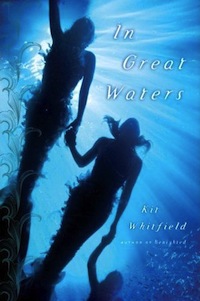Kit Whitfield’s In Great Waters is a truly unusual book. It’s hard to describe—it’s an alternate history where there are merpeople and that has changed everything. The merpeople—or “deepsman” to give them their proper name—are like a missing link between people and dolphins. They only need to surface to breathe every thirty minutes or so. They have tails. They are immensely strong. They have language but they are sub-sapient, they’re at a very interesting cusp of alien that we don’t see explored very much. They can cross-breed with humanity, and we first see them through the eyes of Henry, who is a cross-breed, or “bastard.” He has a bifurcated tail and can only stay underwater for fifteen minutes, but he can lie and say a shark is coming when he’s being bullied by the other children. It’s a lie that always works, and it works on the adults too. Henry has more cunning than the rest of his tribe but has less strength and power. Then he comes out of the water and begins to discover the world of landsmen and how he can relate to them. We discover it all with him, how similar and how different that world is from our history, what a difference the deepsmen have made.
There are going to be no spoilers at all, because I’ve not seen anyone discussing this book. It’s a story that not only has an unusual plot but also a wonderful pattern of discovery that I really wouldn’t want to spoil.
The process of reading In Great Waters is a lot like being thrust underwater—it’s completely immersive. It’s dense and fascinating—Cherryh fans will like it. If I have to compare it to something it would be Cherryh’s Cuckoo’s Egg. The deepsmen are aliens. And yet, they are like us, and like dolphins—this is a carefully extrapolated and complicated culture and natural history. All the implications and second order implications of the existence of the deepsmen have been worked out, and the whole thing feels absolutely solid. By the time we get to our second point-of-view character, Anne, who is also part-deepsman but who has grown up in human society, she seems almost normal in comparison to Henry, whose worldview was formed underwater.
Whitfield is a British writer, and In Great Waters was published in 2009 in the US and the UK. It somehow never had the kind of attention I’d expect a book this good to have. This happens sometimes, and I don’t understand it. It was nominated for a World Fantasy Award (even though it’s clearly SF), but otherwise nobody seems to have been excited about it. This is the sort of book I’d expect people to tell me I want to read, but nobody did. I became aware of Whitfield because of her blog, where she was posting fascinating analyses of the first lines of novels and how well they reflected the rest of the work. I bought In Great Waters on the grounds that somebody who could be so interesting about Lord of the Flies and Nineteen Eighty Four might well have written a good book and deserved my $10 anyway. I was then blown away by how good it was.
Whitfield’s first novel, Bareback in the UK, Benighted in the US, which is Not a Werewolf Book in the same way this is Not a Mermaid book, has been optioned for a movie and I had heard of it. I’d never have read it if I hadn’t loved In Great Waters so much, because hello, werewolves? Me? Well, I read it recently and she made me like werewolves, though not as much as I liked the deepsmen. There are standard modes of writing about these kinds of things—standard genre ways of handling tropes like mermaids and werewolves. There tends to be an attitude that they are a particular kind of fun. This is very much not what Whitfield is interested in, and I wonder whether it might be off-putting to somebody who was expecting something more normal. I was expecting something from a writer who said that the first line of Nineteen Eighty Four was “vehemently simple” and I was not disappointed.
What she does in both these books is to take our culture and add something to it and look hard at what it changes. In Great Waters made me think about royalty and our historical attitude to it, and it made me think about co-existence with aliens, and about theory of mind. It’s a fascinating book.
I’m hoping other people have read it and want to talk about it. If you haven’t read it and you like SF with density and texture, you really should try it.
Jo Walton is a science fiction and fantasy writer. She’s published two poetry collections and nine novels, most recently the Hugo and Nebula winning Among Others. She reads a lot, and blogs about it here regularly. She comes from Wales but lives in Montreal where the food and books are more varied.










